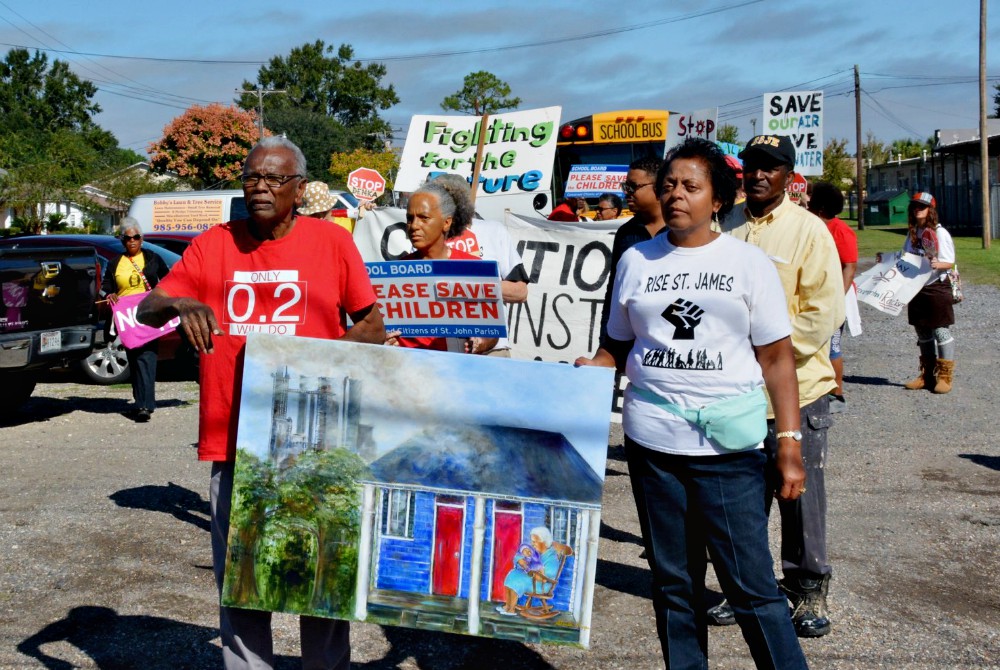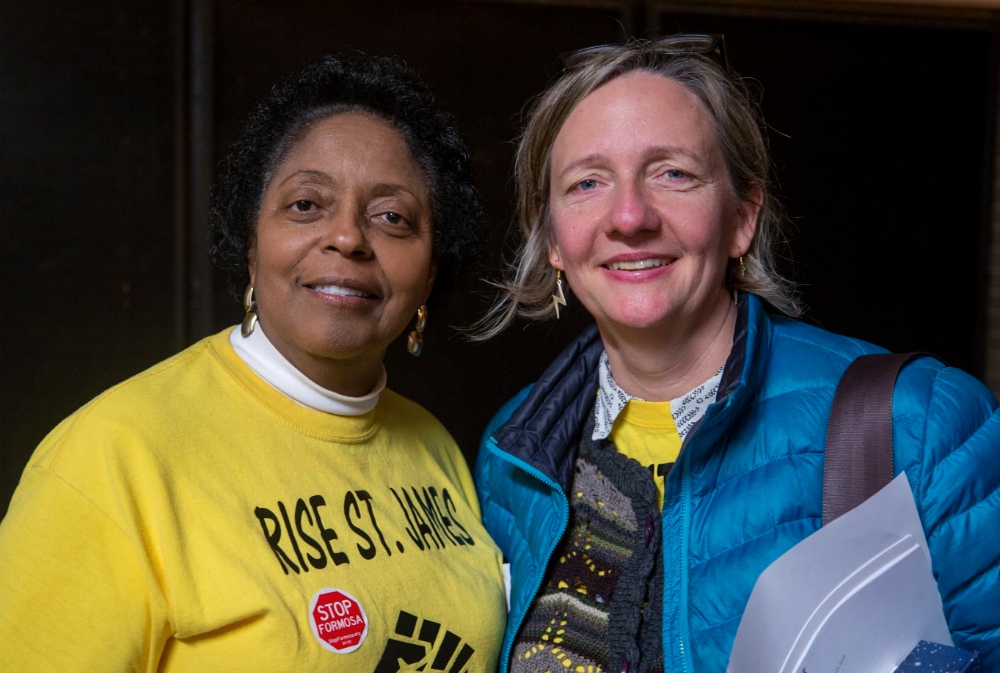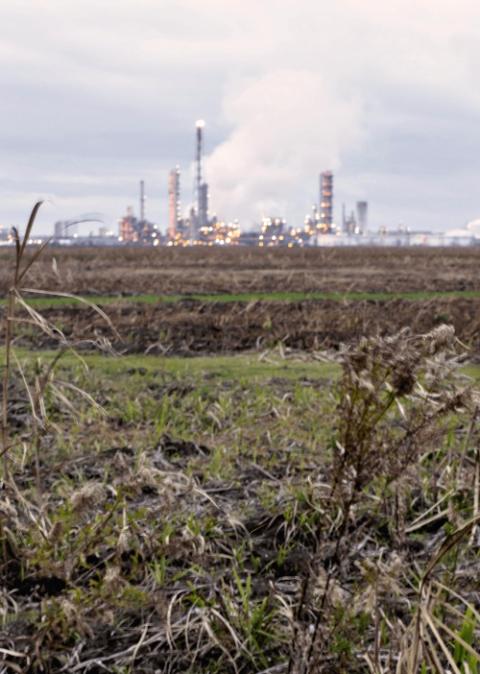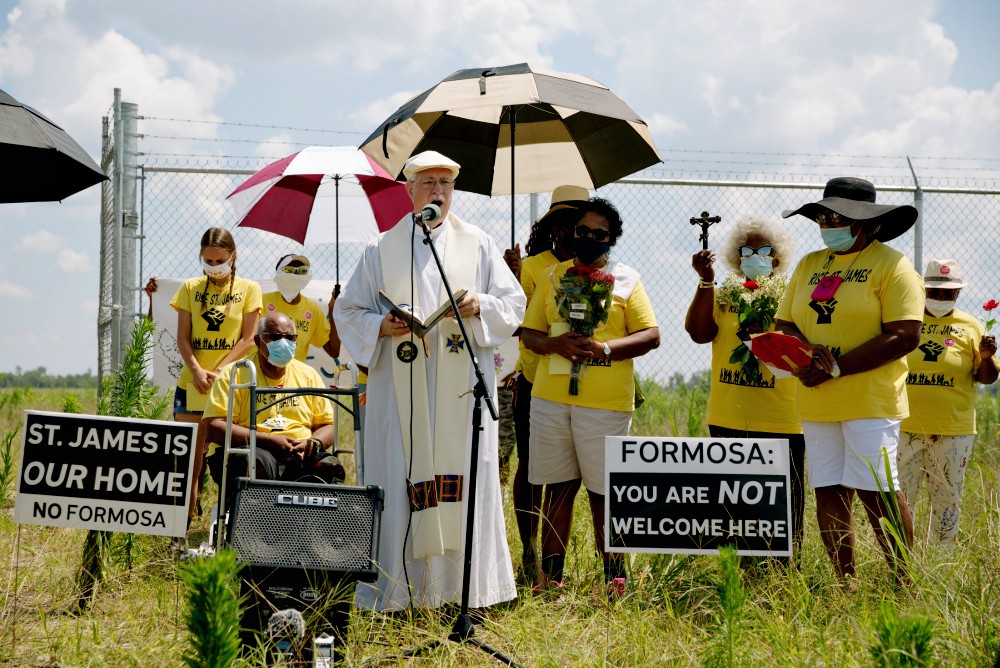
Sharon Lavigne, right, joins a march organized by the Coalition Against Death Alley in Louisiana in October 2019. (Courtesy of Louisiana Bucket Brigade/Tom Wright)
Last May, on the day she turned 69, Sharon Lavigne and three Protestant pastors hiked the levee beside the Mississippi River and looked across the highway at the lush sugarcane fields and wetlands where Taiwan-based Formosa Plastics Group planned to build one of the largest plastics factories in the world.
The 2,400-acre, 14-plant complex would worsen the area's existing pollution overload, spewing cancer-causing chemicals into the air. Opponents say its environmental permits would allow it to emit greenhouse gases equivalent to the output of three and a half coal-fired power plants.
The complex would also disturb or destroy graves of enslaved Black people who were buried on the property, which was once a plantation.
A mile downriver from the Formosa site stands an elementary school, and a mile beyond that, Lavigne's home.
Standing atop the levee, she and her companions recalled the Old Testament story in which Joshua circled the ancient city of Jericho and caused its walls to tumble. Lavigne and the pastors walked six times in a circle, reciting Psalm 23, and on the seventh, they raised their arms skyward and begged God almighty to stop Formosa.
A devout Catholic, Lavigne is at the forefront of a campaign to thwart construction of the plastics complex. Two years ago, she founded Rise St. James, a faith-based, grassroots group made up of residents of the Fifth District of St. James Parish, an area of sugarcane fields and historically black hamlets interlaced with pipelines and industrial facilities.
Backed by environmentalists and community organizations, the group is speaking out for Black communities in St. James that face a new wave of industrial pollution.

Sharon Lavigne, left, with Anne Rolfes of the Louisiana Bucket Brigade, an environmental organization with which Rise St. James works (Courtesy of Louisiana Bucket Brigade)
The group started with protest marches. When the coronavirus pandemic erupted, the activists adapted their strategies and message, pointing out that theirs is a struggle against environmental racism and linking it to national calls for racial justice.
The group's Facebook posts include updates on actions and lawsuits against the corporation, articles on plastics pollution, video clips of parish council meetings where Formosa was on the agenda, and numerous clips of Lavigne urging local officials to rescind approval of the complex.
She often mentions God.
"If you are Christians, if you believe in God, change this," Lavigne says in a Sept. 1 Facebook post. "I know you can't sleep at night because you live in St. James, too. When I am poisoned, you will be poisoned, too. So I ask you to go back, to get on your knees and pray and ask God to put it in your hearts to go back and rescind this decision."
The Formosa complex represents "an assault on human life at all of its stages," says Jesuit Deacon Chris Kellerman of the Jesuit Social Research Institute at Loyola University New Orleans. In an Aug. 27 letter to the News Examiner-Enterprise, a St. James newspaper, Kellerman said ethylene oxide emissions from the facility would jeopardize the unborn, citing studies showing that exposure increases rates of premature births and miscarriages. He noted that adults and school-age children would also be at risk, and he mentioned the graves.
"And all of this without the express consent of the people," wrote Kellerman, who urged local officials to "find other alternative ways of investing in St. James that won't pose such an antilife, racist and existential threat to the parish."
Advertisement
Adding to Cancer Alley risk
In Louisiana, government officials have enthusiastically backed the $9.4 billion Formosa venture, saying it would bring much-needed jobs and revenue to a struggling region. State and local governments offered the petrochemical company $1.5 billion in incentives, mainly property tax exemptions.
Operated by FG LA LLC, a Louisiana affiliate of the Formosa Plastics Group, the complex will manufacture ethylene and propylene used to produce a wide range of plastic goods. Formosa promises 1,200 new jobs with annual salaries averaging $84,700, plus benefits, and 8,000 indirect jobs during construction.
When the state announced the project in April 2018, Timmy Roussel, St. James Parish president at the time, welcomed it, saying it would double the parish's tax base and provide jobs for unemployed and underemployed residents.
But Lavigne says it will put those very people at greater risk. The parish sits in the middle of Louisiana's "Cancer Alley," a corridor of 140 oil refineries and petrochemical plants lining the Mississippi River between Baton Rouge and New Orleans. High rates of COVID-19 deaths plagued the region last spring.
The density of industrial plants is especially high in the Fifth District, where the population is 85% Black and where about one-third of residents have an income below the poverty line. In 2014, a parish land-use plan changed its designation from "residential" to "residential/future industrial," unleashing an influx of new plants and an expansion of old ones.

Landscape in St. James Parish, Louisiana (Courtesy of Louisiana Bucket Brigade)
When Lavigne learned Formosa was coming to her area, she was "outraged," she said. "We already had 12 plants. I couldn't understand why someone would do that to us."
After the parish council voted for the new complex, many people in the community considered it a done deal.
"Everything was can't, can't. I don't believe in that. Let's find a solution," said the mother of six and former schoolteacher. Yet she too struggled with defeatism. One tearful afternoon, she asked God what she should do. The answer Lavigne heard was, "Fight!"
On Sept. 8, 2018, Lavigne and her daughter organized a march to a local park. That evening, 10 people showed up in her living room, asking what they could do. The next month, 20 people gathered and organized a second march, held in November 2018.
"It was my first time getting on the bullhorn," Lavigne said. "We talked and we sang. I didn't know this would go further. One man said he could 'see the Spirit' in me."
Since then, Rise St. James has joined a coalition of environmental and community groups staging protests along Cancer Alley, and Lavigne has testified before a U.S. congressional committee.
History of rights violations
Campaigns like Lavigne's are not uncommon along Cancer Alley. Environmentalists say national and state environmental agencies have done little to protect residents from toxic emissions, leaving communities to fend for themselves.
News reports and a lawsuit filed by environmental groups notes that state permits would allow the complex to emit 800 tons of toxic air pollution annually, an amount equal to emissions from all other plants in the area, and to be one of the largest industrial sources in Louisiana for carcinogenic pollutants like benzene and formaldehyde and one of the largest nationally for ethylene oxide.
"We as a people are fighting Formosa. We should be fighting our local government for not stopping industry," said Harry Joseph of Mount Triumph Baptist Church, one of the pastors who joined Lavigne on the levee last May.
Joseph is among a handful of male Protestant pastors in the Fifth District who support Rise St. James and whose congregations' membership consists mainly of Black women. Some ministers are keeping silent, he thinks, because they have family members or congregants who work in chemical plants.
"What good is something helping you, if that thing is also killing you?" he asked.
Last summer, after a judge ruled that Rise St. James could host a Juneteenth commemoration at the Formosa site despite the company's opposition, Fr. Vincent Dufresne, a Catholic priest, accepted Lavigne's invitation to bless the graves of the formerly enslaved people buried there.
"I am not opposed to industry for the sake of industry," said Dufresne. "As a civil parish, we need the revenue of industry for infrastructure, but industry needs to be a good neighbor. That's where I support Rise St. James. Formosa has a history, as a corporation, of not being as community-sensitive as they claim to be."

Fr. Vincent Dufresne prays at the Formosa site during a 2020 Juneteenth commemoration hosted by Rise St. James. (Courtesy of Louisiana Bucket Brigade/Bron Moyi)
In 2019, the company paid $50 million in a settlement for dumping tiny plastic pellets called "nurdles" off the Texas Gulf Coast.
In Vietnam, toxic waste from a Formosa steel facility contaminated 125 miles of coast in 2016, decimating fisheries and leaving 40,000 people jobless. Victims still await compensation. Catholic bishops and priests spoke out against the company and the government, which they said impeded the investigation, and a Catholic activist was sentenced to nine years in prison for subversion after filming protesting fishermen.
Rise St. James and its allies have also faced pushback. During a protest in October 2019, Baton Rouge police arrested the Rev. Gregory Manning, a Lutheran minister from New Orleans and a leader in the struggle along Cancer Alley, and charged him with inciting a riot.
The bow-tied pastor, who is legally blind, said he could not see the uniform on the man who ordered him and his fellow activists to leave the building where the Louisiana Association of Business and Industry was meeting. The charges were later dropped.
In June, Louisiana Gov. John Bel Edwards vetoed a bill that would have made trespassing on the property of a petrochemical facility and adjacent levees a crime punishable by a mandatory three-year prison term.
And Anne Rolfes and Kate McIntosh of the Louisiana Bucket Brigade, an environmental organization with which Rise St. James works, face terrorism charges for leaving a box of nurdles from the Texas spill on a chemical industry lobbyist's doorstep in December 2019 as a protest.
Construction at the Formosa site is now on hold. Last January, environmental groups filed a lawsuit challenging the project's federal permits, which resulted in Formosa agreeing to delay major construction until early 2021. On Oct. 25, the company announced it would now defer "major construction until the pandemic has subsided and/or an effective vaccine is widely available."
Nevertheless, Lavigne continues to fight, pray and add new allies to the struggle. At her invitation, Catholic Bishop Michael Duca of Baton Rouge will preside over a service at the Formosa site on Oct. 31, the eve of All Saints Day. There, he will pray for the dead buried beneath the sugarcane fields over which Lavigne hurled her Jericho Wall prayer last May.
"The more focus we can keep on that property, the more confident I feel that we are going to win," she said. "[Formosa] is going to see how much we care about it and eventually will back down."
[Claire Schaeffer-Duffy, a freelance writer, lives and works at the Sts. Francis and Therese Catholic Worker in Worcester, Massachusetts.]








